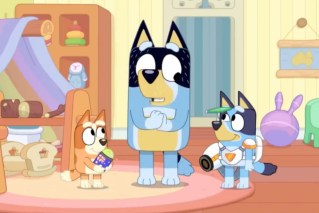Avatar: The Way of Water: Extended dive into the blue is deep – but not meaningful

The Na’vi people soar through the sky on colour-splashed dragons. Photo: 20th Century Studios
The sentimental familiarity and dazzling look of the sequel 13 years after the original Avatar must be its own reward, as we return to idyllic Pandora where Jake Sully (Sam Worthington), a paraplegic marine, stayed after his full-bodied avatar fell in love with the beautiful warrior Neytiri (Zoe Saldana).
In The Way of Water they are loving parents with a brood of pointy-eared children to protect from the Sky People (humans), who want to not just mine Pandora but colonise it. As an aside, the marines are using avatars with uploaded personas to seek revenge against their own turncoat, Sully.
The narrative brush strokes are broad and cheesy. Pandora is lush and tropical, and the elegant Na’vi people are beautiful, peace-loving and playful, gambolling through the skies, soaring and whooping on colour-splashed dragons who they connect to with a filament plait.
Source: Lightstorm Entertainment
What the film lacks in emotional depth it makes up for in action, and Pandora’s forests are soon under attack, forcing Sully to flee and find a new home with the Metkayina clan, a light-green, tattooed people of possible Māori ancestry for whom the sea is a playground. Headed by Tonowari (Cliff Curtis) and Ronal (Kate Winslet), they calm their bodies and fill their lungs so they can spend long stretches under the sea.
After a prickly start, Sully’s family is welcomed, and the children, including a first and second son vying for their father’s attention, show an affinity for life under the sea.
Shifting the arena underwater, reflecting director James Cameron’s personal fascination with all things submarine, creates new vistas for special-effects magnificence, with the added solidity and definition of 3D (which, curiously, few directors have embraced). The story may be pedestrian but the colour and beauty of the under and over-water sequences are impressive.
The relationship of the Na’vi with the sea and its creatures is sympathetic and loving, unlike the grossly parodied Sky People who hunt and kill tulkun, a highly intelligent creature like a whale.
The tulkun may not be real but their slaughter is hard to watch and their vengeance, when it comes, is gratifying. The ugly humans in this case are headed by a comically merciless boat captain, Mick Scoresby (Brendan Cowell), who happens to be an Aussie.
Grounding an undersea film so audiences have something to connect to is a challenge, and early on Cameron discarded the idea of photoshopping the actors into underwater settings. All those involved – actors and camera people – were trained to hold their breath for extended motion-capture filming; Winslet held hers for more than seven minutes, breaking Tom Cruise’s record.
This huge investment in the superficial lends the film a hyper-real grace that offers respite from the action, which is loud and relentless.
The Way of Water is needlessly long, as films costing $350 million tend to be, driven by a plot that is shallow and formulaic. The marine colonel, Miles Quaritch (Stephen Lang), who is the reincarnation of Sully’s nemesis, is a determined foe and targets Sully’s family to get to him.
A twist at the end involving Sully’s adopted son, a feral surfer boy, sets us up for the next one. Personally, I’m not holding my breath.
Avatar: The Way of Water is in cinemas now
This review first appeared in InDaily. Read the original here








